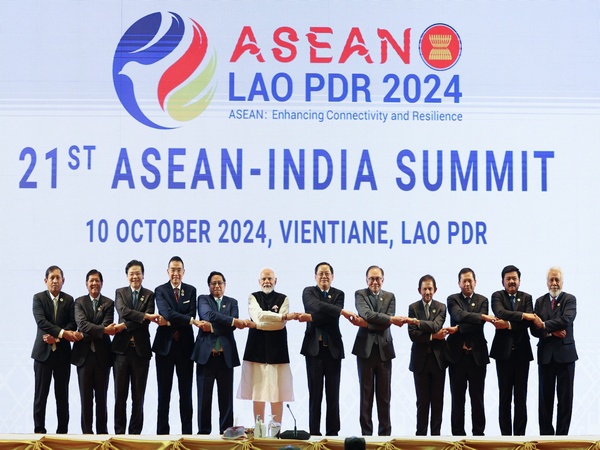Amid heightened tension in the South China Sea, India and ASEAN nations on Thursday called for an effective implementation of the Declaration on the Conduct of the Parties in the South China Sea (DOC) and looked forward to the early conclusion of a substantive Code of Conduct in the South China Sea (COC), in accordance with international law, including the 1982 UNCLOS.
“Reaffirm the importance of maintaining and promoting peace, stability, maritime safety and security, freedom of navigation and overflight in the region, and other lawful uses of the seas, including unimpeded lawful maritime commerce and to promote peaceful resolutions of disputes, in accordance with universally recognised principles of international law, including the 1982 UNCLOS, and the relevant standards and recommended practices by the International Civil Aviation Organization (ICAO) and the International Maritime Organization (IMO). In this regard, we support the full and effective implementation of the Declaration on the Conduct of the Parties in the South China Sea (DOC) in its entirety and look forward to the early conclusion of an effective and substantive Code of Conduct in the South China Sea (COC) that is in accordance with international law, including the 1982 UNCLOS,” read the oint statement on Strengthening ASEAN-India Comprehensive Strategic Partnership for Peace, Stability and Prosperity in the Region in the context of the ASEAN Outlook on the Indo-Pacific (AOIP) with the support of India’s Act East Policy (AEP).
It is pertinent to note that as China flexes its muscles, the Philippines has called for the finalisation of the ASEAN-China Code of Conduct (COC). China illegally claims the entire South China Sea as its own and has frequently attacked Philippines vessels in the region.
The joint statement called to strengthen cooperation in maritime security, counter-terrorism, cybersecurity, military medicine, transnational crime, defence industry, humanitarian assistance and disaster relief, peacekeeping and demining operations and confidence building measures.
This will be achieved through the exchange of visits, joint military exercise, maritime exercise, port calls by naval ships and defence scholarships
“Build on ongoing collaboration in defense and security within the framework of ASEAN Defence Ministers’ Meeting (ADMM) Plus, including the first ASEAN-India Maritime Exercise (AIME) in 2023 and co-chairmanship of the ADMM-Plus Experts’ Working Group on Counter-Terrorism (2024-2027), as well as noting the two initiatives announced at the ASEAN-India Defence Ministers’ Informal Meeting in 2022,” added the statement.
They also declared to advance the implementation of ASEAN-India Joint Statement on Maritime Cooperation and continue to cooperate on areas such as maritime security, blue economy, sustainable fisheries, marine environmental protection, marine biodiversity, and climate change issues, among others.
“Promote and work towards the strengthening of multilateralism through the UN and the multilateral processes to address global concerns, pursue shared goals and complementary initiatives, and promote sustainable development for the benefit of our peoples,” added the statement.
It also called on to build on the ASEAN-India Joint Statement on Cooperation on the AOIP for Peace, Stability, and Prosperity in the Region by advancing cooperation between the AOIP and the Indo-Pacific Oceans Initiative (IPOI).
Cooperation in defence and security was highlighted in the statement, with plans for ongoing collaboration through the ASEAN Defence Ministers’ Meeting. Initiatives such as the ASEAN-India Maritime Exercise in 2023 and co-chairmanship of the ADMM-Plus Experts’ Working Group on Counter-Terrorism between 2023 and 2027 were also noted.
The advancement of the ASEAN-India Joint Statement on Maritime Cooperation was also part of the discussions, focusing on sustainable fishing, marine biodiversity, and climate change.
Connectivity efforts between ASEAN and India were also addressed, with a focus on aligning various connectivity initiatives to enhance transport across land, air, and maritime domains. The completion of the India-Myanmar-Thailand Trilateral Highway was identified as a priority, with future plans for its extension towards eastward Laos, Cambodia and Vietnam, which come under India’s connectivity initiatives in the region under India’s Act East Policy and SAGAR vision in the Indo-Pacific.
The statement further explored potential synergies with sub-regional frameworks, including the Indian Ocean Rim Association and the Bay of Bengal Initiative for Multi-Sectoral Technical and Economic Cooperation, to promote equitable development.
Furthermore, both regions agreed to strengthen cooperation in areas such as maritime security, counter-terrorism, and humanitarian assistance through joint exercises, exchanges, and collaborative efforts.
Both parties also acknowledged the deep civilisational linkages and cross-cultural exchanges facilitated through land and maritime routes between Southeast Asia and India, encompassing the various seas and oceans of the Indo-Pacific, providing a strong foundation for the Comprehensive Strategic Partnership.
ASEAN nations also recognised India’s support for centrality and unity in regional architecture and further its commitment to work closely through ASEAN-led mechanisms and fora including the ASEAN-India Summit, East Asia Summit (EAS), Post Ministerial Conference with India (PMC+1), ASEAN Regional Forum (ARF), ASEAN Defence Ministers’ Meeting Plus (ADMM-Plus) and Expanded ASEAN Maritime Forum (EAMF), as well as support to ASEAN integration and the ASEAN Community building process, including the Master Plan for ASEAN Connectivity (MPAC) 2025, Initiative for ASEAN Integration (IAI) and ASEAN Outlook on the Indo-Pacific (AOIP).-ANI


